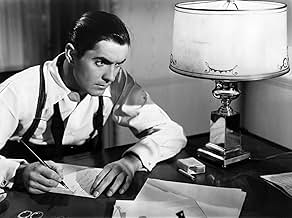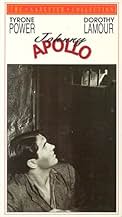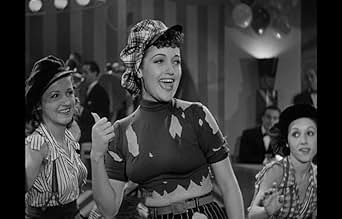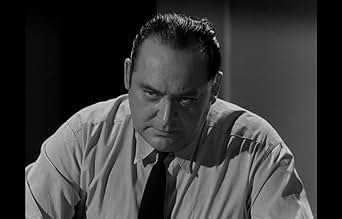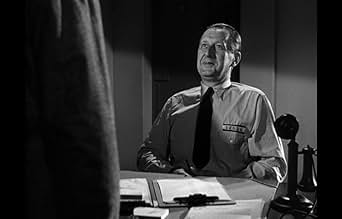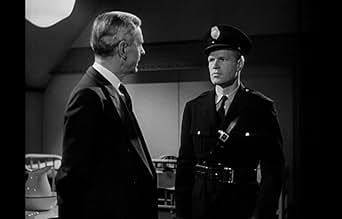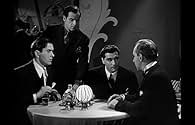IMDb RATING
6.9/10
1.6K
YOUR RATING
The son of a jailed Wall Street broker turns to crime to pay for his father's release.The son of a jailed Wall Street broker turns to crime to pay for his father's release.The son of a jailed Wall Street broker turns to crime to pay for his father's release.
- Awards
- 2 wins total
Selmer Jackson
- Warden
- (as Selmar Jackson)
Gary Breckner
- Announcer
- (voice)
Featured reviews
Tyrone Power plays privileged young man Bob Cain, Jr., who adopts the nom de guerre Johnny Apollo when he takes to a life of crime. (Incidentally, this movie thus kicks off a string of at least a dozen crime stories of the 40s and 50s named Johnny Something-Or-Other: Eager, O'Clock, Stool Pigeon....) Power chooses crime to spite his father (Edward Arnold) by emulating his dog-eat-dog ethics, for financial tycoon Arnold has been sent to prison for embezzlement, causing a rift between the generations.
After Power's initial snit over Dad's letting him down, his attempts to secure him an early parole lead, though `connected' shantoozie Dorothy Lamour, to the underworld. The muscles he developed rowing crew in the Ivy League stand him in good stead as muscle in the mob, for soon he becomes a trusted lieutenant in Lloyd Nolan's crime family (plausibility is not the movie's long suit). But Pop (who has reclaimed his spiritual center in the Big House by welding boilers) disowns his namesake when he learns of his new line of work. In due time, of course, Power ends up behind those bars as well. But that's far from the end of the tale....
The plot of Johnny Apollo, a major production, takes a few turns too many but manages to keep a just-passable amount of credibility. Though Power, in the lead, stays less than persuasive as a menacing mobster he's too much of a pretty-boy, and lacks the acting resources to turn himself into a pretty-boy psychopath the rest of the cast compensates. Predictably, Arnold is good, as is, in the role of a mob mouthpiece with a weakness for Scotch-and-milk, Charlie Grapewin (whose first film credit falls in the last year of the 19th Century!); the two seem to be vying for title of America's sweetheart, old-codger division. Best of all is Lamour, with her sad eyes and fetching pout, who leaves an impression here of a skilled actress, more than she managed in all the Hope-Crosby `Road' pictures put together.
Direction is by Henry Hathaway, an uneven craftsman who nonetheless rose to the occasion for a handful of movies; this can be counted among his stronger efforts, along with The Dark Corner, Kiss of Death, Fourteen Hours and Niagara. But Johnny Apollo cleaves more closely to the crime melodramas of the previous decade than to the unsentimental and ambiguous style soon to come. But, in it, one can nonetheless sense particularly in its heavily shaded photography the birth pangs of film noir, struggling to come into the world.
After Power's initial snit over Dad's letting him down, his attempts to secure him an early parole lead, though `connected' shantoozie Dorothy Lamour, to the underworld. The muscles he developed rowing crew in the Ivy League stand him in good stead as muscle in the mob, for soon he becomes a trusted lieutenant in Lloyd Nolan's crime family (plausibility is not the movie's long suit). But Pop (who has reclaimed his spiritual center in the Big House by welding boilers) disowns his namesake when he learns of his new line of work. In due time, of course, Power ends up behind those bars as well. But that's far from the end of the tale....
The plot of Johnny Apollo, a major production, takes a few turns too many but manages to keep a just-passable amount of credibility. Though Power, in the lead, stays less than persuasive as a menacing mobster he's too much of a pretty-boy, and lacks the acting resources to turn himself into a pretty-boy psychopath the rest of the cast compensates. Predictably, Arnold is good, as is, in the role of a mob mouthpiece with a weakness for Scotch-and-milk, Charlie Grapewin (whose first film credit falls in the last year of the 19th Century!); the two seem to be vying for title of America's sweetheart, old-codger division. Best of all is Lamour, with her sad eyes and fetching pout, who leaves an impression here of a skilled actress, more than she managed in all the Hope-Crosby `Road' pictures put together.
Direction is by Henry Hathaway, an uneven craftsman who nonetheless rose to the occasion for a handful of movies; this can be counted among his stronger efforts, along with The Dark Corner, Kiss of Death, Fourteen Hours and Niagara. But Johnny Apollo cleaves more closely to the crime melodramas of the previous decade than to the unsentimental and ambiguous style soon to come. But, in it, one can nonetheless sense particularly in its heavily shaded photography the birth pangs of film noir, struggling to come into the world.
I found this to be a fairly interesting crime story, the emphasis being more on the story and less on the action. What little action there is takes place at the end of the movie.
Lloyd Nolan plays a low-key gangster and Tyrone Power plays a guy who exhibits good and bad. Dorothy Lamour, Edward Arnold, Charley Grapewin and Lionel Atwill all add to this talented cast. Lamour's tough-talking "dame" character and good cinematography helped this movie be characterized as a very early entry into the film noir genre.
The problem with the movie was the believability of the story. There were too many unanswered questions in here. Why was this person arrested? How and why could this happen, and that? There are lots of holes in here and sometimes they were so prevalent they broke up the continuity of the story.
Okay for one curious look but not worth a purchase, although it's still not available on DVD anyway, and few people buy new VHS tapes anymore.
Lloyd Nolan plays a low-key gangster and Tyrone Power plays a guy who exhibits good and bad. Dorothy Lamour, Edward Arnold, Charley Grapewin and Lionel Atwill all add to this talented cast. Lamour's tough-talking "dame" character and good cinematography helped this movie be characterized as a very early entry into the film noir genre.
The problem with the movie was the believability of the story. There were too many unanswered questions in here. Why was this person arrested? How and why could this happen, and that? There are lots of holes in here and sometimes they were so prevalent they broke up the continuity of the story.
Okay for one curious look but not worth a purchase, although it's still not available on DVD anyway, and few people buy new VHS tapes anymore.
Embezzler Edward Arnold goes to prison and son Tyrone Power tries to make it on his own honestly. Doesn't work out well. So Tyrone decides Pop was right and that the only way to make it ahead in the world is by being a crook. So he hooks up with gangster Lloyd Nolan and falls for Nolan's girl Dorothy Lamour. When Arnold finds out what his son is up to, he's none too pleased.
Enjoyable gangster drama with a fine cast. Some have said Power is miscast. I think he's okay for the part. It's not really a gritty movie, despite the plot. Maybe if it had been a tough film noir, I could see the point that Power was wrong for the role. But it's not and he isn't. Edward Arnold is good. I doubt the man ever did a bad acting job in his career. His character is somewhat poorly written and hard to relate to, but it's difficult to dislike him due to Arnold's sympathetic performance. Nice to see Charley Grapewin playing something besides a grizzled old-timer without most of his marbles. Beautiful Dorothy Lamour is always a plus and it's good to see her in a serious role. Lloyd Nolan pretty much steals the movie as the gangster Mickey Dwyer. Lionel Atwill is largely wasted as Arnold's attorney.
The biggest flaw with the movie is that its plot isn't always consistent. Arnold's character is a crook who first treats his son like crap for not being okay with his crookedness. Then later he treats his son like crap for becoming a criminal like Dad. Still, it's an enjoyable movie. The script's got some nice dialogue. Watch for the scene where Power chases, tackles, and beats Marc Lawrence's head against the ground! Yikes!
Enjoyable gangster drama with a fine cast. Some have said Power is miscast. I think he's okay for the part. It's not really a gritty movie, despite the plot. Maybe if it had been a tough film noir, I could see the point that Power was wrong for the role. But it's not and he isn't. Edward Arnold is good. I doubt the man ever did a bad acting job in his career. His character is somewhat poorly written and hard to relate to, but it's difficult to dislike him due to Arnold's sympathetic performance. Nice to see Charley Grapewin playing something besides a grizzled old-timer without most of his marbles. Beautiful Dorothy Lamour is always a plus and it's good to see her in a serious role. Lloyd Nolan pretty much steals the movie as the gangster Mickey Dwyer. Lionel Atwill is largely wasted as Arnold's attorney.
The biggest flaw with the movie is that its plot isn't always consistent. Arnold's character is a crook who first treats his son like crap for not being okay with his crookedness. Then later he treats his son like crap for becoming a criminal like Dad. Still, it's an enjoyable movie. The script's got some nice dialogue. Watch for the scene where Power chases, tackles, and beats Marc Lawrence's head against the ground! Yikes!
Am incredibly fond of crime dramas, both the Phillip Marlowe/Raymond Chandler/film noir-type ones and the more elaborate, more violent ones such as the likes of 'The Godfather' and 'Goodfellas'. The cast also promised a lot, with the most intriguing on paper being an against type Tyrone Power. So they were my two main reasons for seeing 'Johnny Apollo', as well as liking the idea of the story and hearing good things from critics whose opinions are mostly worth trusting.
'Johnny Apollo' turned out to be a well done, fun film with a vast majority of elements executed excellently. If you like any of the actors, good casts and like the type of film it fits under, there is a fairly strong chance of you enjoying 'Johnny Apollo'. It is not a perfect film or one that blows the mind, but there are absolutely no regrets watching it. Quite the contrary and actually thought it was a much needed antidote after a difficult week.
Not everything works. Credibility is strained to the maximum, particularly the final act which also felt a bit too rushed and culminates on a too unrealistically pat and almost sugary note. Arnold's attitude towards his son regarding the crookedness seemed inconsistent and one is not sure as to why.
While the songs are great on their own, don't feel out of place and are beautifully sung by Dorothy Lamour ("They Say" is a hit for good reason, and "This is the Beginning of the End" is especially well sung), they interrupted the flow a bit. Lionel Atwill has far too little to do and struggles to do much with it.
Power however does quite well in an atypical role that required a lot of grit and Power provides that, more than just a handsome face that he was clearly trying to break away from admirably. Actually felt though that the supporting cast were even better, while Dorothy Lamour is an absolute charmer as the female lead the acting honours go to Edward Arnold, as the character who gets my vote as the most interesting, and Lloyd Nolan's unflinching gangster. Enjoyed Charley Grapewin too. The script is taut and has the right amount of suspense and entertainment value.
Henry Hathaway directs with ease and seemed to understand the genre, and the story is suitably hard-boiled and intriguing even if it is not flawlessly executed. The pace is controlled yet generally compelling when the flow is not interrupted. There is some authentic period detail enhanced by the gritty photography and eerie lighting.
In summation, pretty good and recommended though not an essential. 7/10
'Johnny Apollo' turned out to be a well done, fun film with a vast majority of elements executed excellently. If you like any of the actors, good casts and like the type of film it fits under, there is a fairly strong chance of you enjoying 'Johnny Apollo'. It is not a perfect film or one that blows the mind, but there are absolutely no regrets watching it. Quite the contrary and actually thought it was a much needed antidote after a difficult week.
Not everything works. Credibility is strained to the maximum, particularly the final act which also felt a bit too rushed and culminates on a too unrealistically pat and almost sugary note. Arnold's attitude towards his son regarding the crookedness seemed inconsistent and one is not sure as to why.
While the songs are great on their own, don't feel out of place and are beautifully sung by Dorothy Lamour ("They Say" is a hit for good reason, and "This is the Beginning of the End" is especially well sung), they interrupted the flow a bit. Lionel Atwill has far too little to do and struggles to do much with it.
Power however does quite well in an atypical role that required a lot of grit and Power provides that, more than just a handsome face that he was clearly trying to break away from admirably. Actually felt though that the supporting cast were even better, while Dorothy Lamour is an absolute charmer as the female lead the acting honours go to Edward Arnold, as the character who gets my vote as the most interesting, and Lloyd Nolan's unflinching gangster. Enjoyed Charley Grapewin too. The script is taut and has the right amount of suspense and entertainment value.
Henry Hathaway directs with ease and seemed to understand the genre, and the story is suitably hard-boiled and intriguing even if it is not flawlessly executed. The pace is controlled yet generally compelling when the flow is not interrupted. There is some authentic period detail enhanced by the gritty photography and eerie lighting.
In summation, pretty good and recommended though not an essential. 7/10
Sometimes it's best with some films to turn off your brain and just enjoy. You can't think through the plot too much or your head might just explode! This is exactly the sort of film JOHNNY APOLLO is--very entertaining and fun but also with a plot that strains credibility way beyond the breaking point.
The film begins with Edward Arnold being arrested for stock fraud. Suddenly, his millions are gone and his son (Tyrone Power) must leave school and fend for himself. In a very odd scene between the two before Arnold is sent to prison, Tyrone expresses disappointment in his father and Arnold responds by disowning him! Considering everything that Arnold had done, his sanctimonious response was perplexing. Despite being disowned, Power did still care about his father. However, he was also shocked to see that Dad's reputation ruined his chance to get a job--as everyone held this against him. Then, after changing his name, his only employer fired him because he DIDN'T acknowledge Arnold as his father! Sometimes you just can't win.
Now, without a job AND wanting to earn enough money to hire a shyster lawyer to file an appeal (as responsible ones won't), Tyrone approaches a drunken lawyer who has a history of playing fast and loose with the truth. In the process, he comes to know a notorious hood (Lloyd Nolan) and is soon hired--and he's now on the fast track to be able to afford the lawyer and to "grease the right palms" to get Arnold sprung from jail. Oddly, however, they never really show or talk about Power doing anything especially illegal!
Soon after beginning work with Nolan, Power has a reconciliation with Dad when he visits the prison. However, when Arnold learns that his son is working for the underworld, he vows, once again, to have nothing to do with Power. Again, this makes little sense. The first time, he disowns him for not being for accepting of his evil ways and now that Power, too, is a crook the father can't accept him once again! There's a lot more to the plot than this and Power even eventually is imprisoned in the same place as his dad!
Along for the ride is Dorothy Lamour as a lounge singer with a heart of gold and Charlie Grapewin (in one of his best roles) as the crooked attorney. All in all the acting (especially Nolan and Arnold) is very good and the film has so many plot elements and twists that it is a decent example of early Film Noir. Entertaining and impossibly improbable--plus it really is a bit hard to believe Power as a mobster.
The film begins with Edward Arnold being arrested for stock fraud. Suddenly, his millions are gone and his son (Tyrone Power) must leave school and fend for himself. In a very odd scene between the two before Arnold is sent to prison, Tyrone expresses disappointment in his father and Arnold responds by disowning him! Considering everything that Arnold had done, his sanctimonious response was perplexing. Despite being disowned, Power did still care about his father. However, he was also shocked to see that Dad's reputation ruined his chance to get a job--as everyone held this against him. Then, after changing his name, his only employer fired him because he DIDN'T acknowledge Arnold as his father! Sometimes you just can't win.
Now, without a job AND wanting to earn enough money to hire a shyster lawyer to file an appeal (as responsible ones won't), Tyrone approaches a drunken lawyer who has a history of playing fast and loose with the truth. In the process, he comes to know a notorious hood (Lloyd Nolan) and is soon hired--and he's now on the fast track to be able to afford the lawyer and to "grease the right palms" to get Arnold sprung from jail. Oddly, however, they never really show or talk about Power doing anything especially illegal!
Soon after beginning work with Nolan, Power has a reconciliation with Dad when he visits the prison. However, when Arnold learns that his son is working for the underworld, he vows, once again, to have nothing to do with Power. Again, this makes little sense. The first time, he disowns him for not being for accepting of his evil ways and now that Power, too, is a crook the father can't accept him once again! There's a lot more to the plot than this and Power even eventually is imprisoned in the same place as his dad!
Along for the ride is Dorothy Lamour as a lounge singer with a heart of gold and Charlie Grapewin (in one of his best roles) as the crooked attorney. All in all the acting (especially Nolan and Arnold) is very good and the film has so many plot elements and twists that it is a decent example of early Film Noir. Entertaining and impossibly improbable--plus it really is a bit hard to believe Power as a mobster.
Did you know
- TriviaIn the scene with Johnny and his father talking in the bedroom, the photo over Johnny's shoulder of his mother, is a picture of Tyrone Power's mother.
- GoofsWhen Mickey comes into the judge's offices after the judge has smashed the two whisky bottles, he comments that the room smells like a brewery. It is more likely that the room would smell like a distillery rather than a brewery and Mickey would be aware of the difference.
- Quotes
Prisoner Tom Dugan: I steal an empty slot machine and get 10 years, and this guy steals a million and gets 5. Figure that out, will yuh?
Main Reporter: [Sarcastically] That's why you got the 10 - to figure it out.
- ConnectionsFeatured in Les enquêtes de Remington Steele: Cast in Steele (1984)
- SoundtracksThis Is the Beginning of the End
(1940)
Written by Mack Gordon
Performed by Dorothy Lamour (uncredited) with Harry Rosenthal (uncredited) at piano
Played as background music often
- How long is Johnny Apollo?Powered by Alexa
Details
- Release date
- Country of origin
- Language
- Also known as
- Dance with the Devil
- Filming locations
- Sing Sing Penitentiary - 354 Hunter Street, Ossining, New York, USA(exteriors: prison)
- Production company
- See more company credits at IMDbPro
- Runtime1 hour 34 minutes
- Color
- Aspect ratio
- 1.37 : 1
Contribute to this page
Suggest an edit or add missing content


